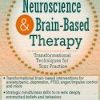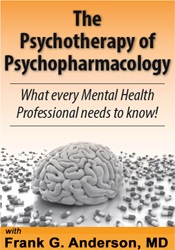The Psychotherapy of Psychopharmacology: What every Mental Health Professional needs to know! – Frank G. Anderson | Available Now !
$200.00 Original price was: $200.00.$56.00Current price is: $56.00.
The Psychotherapy of Psychopharmacology: What every Mental Health Professional needs to know! – Frank G. Anderson | INSTANTLY DOWNLOAD !
Many professionals like you are intimidated by the risks associated with psychiatric medications:
- How do you know if psychiatric meds are the best choice for your client right now?
- Could a new medication provide better patient outcomes?
- Could drug side effects make your client worse?
- How do I remember the names of all these drugs and what they do?
Like most mental health professionals you imagine you play no role with your clients and their meds. But you do play an important role in the success of medications your clients take.
This workshop will teach you what you need to know to become better informed, proactive, and effective in working with clients and medications. You will:
- Determine when a psychopharmacology consultation is necessary
- Help clients effectively communicate with their prescriber
- Learn the best prescribing practices for treating depression, bipolar disorder, anxiety, PTSD, dissociation, psychotic disorders, insomnia, ADHD, and more …
- Learn how to stay involved throughout the prescribing process – increasing the likelihood of medication success
- Help clients understand that medications treat symptoms – not feeling or diagnoses
In addition, you will learn how medications work to permanently change the brain and calm down the nervous system. By simply knowing the functions of the five neurotransmitters (serotonin, norepinephrine, dopamine, glutamate and GABA), you will have a solid understanding for which medications treat which syndromes. We will also discuss the benefits and uses of alternative and complimentary medications as well as what is new and emerging in the world of psychopharmacology.
You will walk away from this workshop with all you need to know to help your clients avoid the risk of experiencing unnecessary side effects, having poor compliance, taking to many meds (poly-pharmacy) or even taking the wrong medications for their symptoms.
- Distinguish between the biological and psychological components of psychiatric symptoms and learn how to work collaboratively with both.
- Explore your client’s attitude and responses toward medication, such as fears of changes in personality, becoming dependent, ingesting a foreign substance, losing symptoms, or uncovering wounds and vulnerabilities.
- Examine your own feeling and beliefs around meds that can get in the way of the therapeutic process.
- Explain how psychiatric medications work in the brain.
- Summarize the best prescribing practices for treating depression, bipolar disorder, anxiety, PTSD, dissociation, psychotic disorders, insomnia, ADHD, and more.
- Describe alternative treatments and medications new to the market.
Get The Psychotherapy of Psychopharmacology: What every Mental Health Professional needs to know! of author Frank G. Anderson
The Therapist’s Role
- Determining when a med consult is appropriate
- What prescribers need to hear from you
- Prepare your client to talk to their prescriber
- Working with your own feelings and beliefs about medications
Preparing your client
- Exploring your client’s hopes and fears about medications
- Help your client differentiate a psychological issue from a biological syndrome
- Uncover the roadblocks to successful treatment
Neurotransmitters and Receptors
- How medications work in the brain
- The Five Neurotransmitters: All you need to know
- Cortisol and the stress response
- Matching symptoms with the correct medications
Antidepressants
- For the treatment of depression, anxiety, PTSD, OCD and more
- SSRI’s, SNRI’s and dual agents
- Dealing with sexual side effects
- How to boost the antidepressant response
- Treating kids and the elderly
- Hormones and mood: What’s the connection?
Anti-Anxiety Medications
- Benzodiazepines- why they are so addictive?
- Why so many doctors prescribe them
- How to help clients use them appropriately and get off them safely
- What is best med for acute trauma?
Mood Stabilizers
- How they work to treat bipolar disorder, PTSD and more
- Why is compliance such a big issue?
- Dealing with the drawbacks and downsides
Antipsychotics
- For treating schizophrenia, bipolar disorder, PTSD, dissociation & more
- Why the upsurge in popularity?
- The differences between the old and new antipsychotics
- What I need to know about “metabolic syndrome?”
Meds for ADHD, Sleep Disorders and Substance Abuse
- Are they addictive? Do they actually work?
- Why are they overprescribed?
- How do I help my clients use them safely?
Exploring Alternative Treatments
- Acupuncture
- Omega 3 fatty acids
- St John’s wart
- Diet & exercise
- Light therapy
- Medical marijuana…and more!
What’s new and what’s in the pipeline?
Get The Psychotherapy of Psychopharmacology: What every Mental Health Professional needs to know! of author Frank G. Anderson
1 review for The Psychotherapy of Psychopharmacology: What every Mental Health Professional needs to know! – Frank G. Anderson | Available Now !
| 5 star | 100 | 100% |
| 4 star | 0% | |
| 3 star | 0% | |
| 2 star | 0% | |
| 1 star | 0% |
Sorry, no reviews match your current selections
Q & A
Ask a question
Your question will be answered by a store representative or other customers.
Thank you for the question!
Your question has been received and will be answered soon. Please do not submit the same question again.
Error
An error occurred when saving your question. Please report it to the website administrator. Additional information:
Add an answer
Thank you for the answer!
Your answer has been received and will be published soon. Please do not submit the same answer again.
Error
An error occurred when saving your answer. Please report it to the website administrator. Additional information:
Related products
NLP & Hypnosis
NLP & Hypnosis
Ecommerce
NLP & Hypnosis
Ecommerce












Perfect! Very pleased with transaction. | The Psychotherapy of Psychopharmacology: What every Mental Health Professional needs to know! – Frank G. Anderson